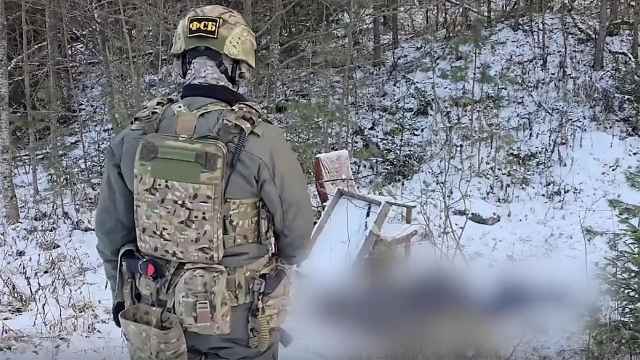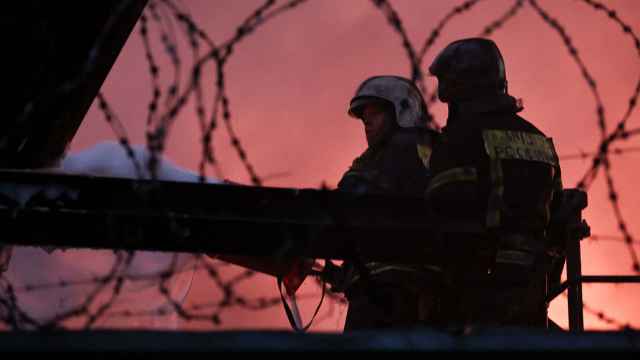Astrakhan has suddenly become the political epicenter of Russia.
A political crisis arose out of nowhere thanks to A Just Russia member Oleg Shein, who has been on a hunger strike for a month to protest the electoral fraud that he claims robbed him of his victory in the mayoral race in Astrakhan.
Shein and his fellow hunger strikers are showing the usual signs of starvation: They are as pale as ghosts, frail and are always running a fever. Meanwhile, in the plush State Duma last week, President-elect Vladimir Putin said: "As far as I know, Oleg Shein began a hunger strike but did not go to court. Honestly, it's a little strange. Why starve? Perhaps, a court will still investigate, and everyone will agree with the results of that investigation."
Whenever there is problem that Putin wants to avoid, he advises the aggrieved parties to take their case to Russia's courts — infamous for their loyalty to the Kremlin (or anyone who is willing to pay them enough money).
But this time, he couldn't get away with this tactic so easily. After Putin made the scoffing comments in the Duma about how Shein should take his complaints to court, all of the deputies from A Just Russia — led by Sergei Mironov, a former Putin crony — walked out of the Duma chamber.
It is strange that the authorities are being so stubborn in opposing Shein. For one, mayors carry almost no political weight in Russia. Second, Shein is a nationalist who never tires of criticizing the United States. He also wrote a jingoistic book titled "The Defeat of the Georgian Occupiers of Tskhinvali." So why doesn't the Kremlin cut a deal with him?
Could the reason simply be that both the former and current Astrakhan mayors have close ties to the "gray cardinal" of the Kremlin, First Deputy Chief of Staff Vyacheslav Volodin?
It is worth remembering former Astrakhan Mayor Sergei Bozhenov, whose tenure is best known for a series of Astrakhan fires in 2005-06 in which 28 people died. Later, the Astrakhan City Hall reportedly sold that land to developers.
Then, Shein ran for mayor in Astrakhan in 2009 — a race he clearly would have also won if there hadn't been electoral fraud. His close associates were beaten and threatened not by the cops, but by thugs. (Usually, the authorities prefer using police rather than gangsters to fulfill these missions.)
Notably, after Kremlin ideologist Vladislav Surkov was replaced by Volodin, Bozhenov was shifted from his job as mayor of Astrakhan and appointed governor of the Volgograd region.
What could be the reason for this? If Volodin decided that Bozhenov's presence in Astrakhan during the March presidential election could trigger massive protests there, why was he given a new fiefdom? And if Volodin really considered Bozhenov to be a good mayor, why didn't he leave him in Astrakhan?
Maybe things are not as complicated as they seem. Perhaps, Bozhenov simply bought himself his new job. After all, if a person leaves the store carrying a pound of meat, it most likely means he paid the cashier for it.
Either way, the authorities are not about to change the results of the Astrakhan election simply because Shein and others refuse to eat. If they did, that would mean that Putin had caved in. But everybody knows that Putin answers to nobody, least of all to voters. Sooner or later, this will be his undoing.
Yulia Latynina hosts a political talk show on Ekho Moskvy radio.
A Message from The Moscow Times:
Dear readers,
We are facing unprecedented challenges. Russia's Prosecutor General's Office has designated The Moscow Times as an "undesirable" organization, criminalizing our work and putting our staff at risk of prosecution. This follows our earlier unjust labeling as a "foreign agent."
These actions are direct attempts to silence independent journalism in Russia. The authorities claim our work "discredits the decisions of the Russian leadership." We see things differently: we strive to provide accurate, unbiased reporting on Russia.
We, the journalists of The Moscow Times, refuse to be silenced. But to continue our work, we need your help.
Your support, no matter how small, makes a world of difference. If you can, please support us monthly starting from just $2. It's quick to set up, and every contribution makes a significant impact.
By supporting The Moscow Times, you're defending open, independent journalism in the face of repression. Thank you for standing with us.
Remind me later.





